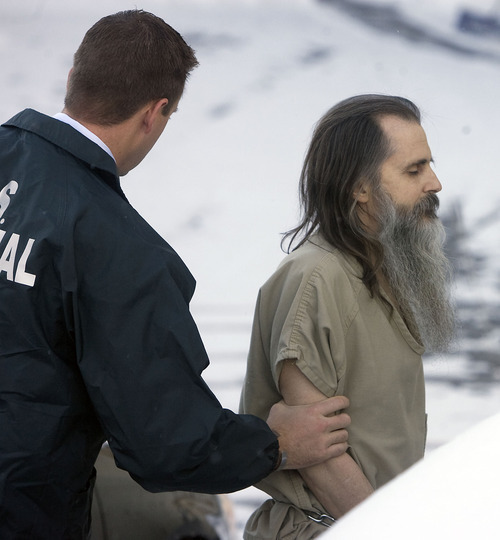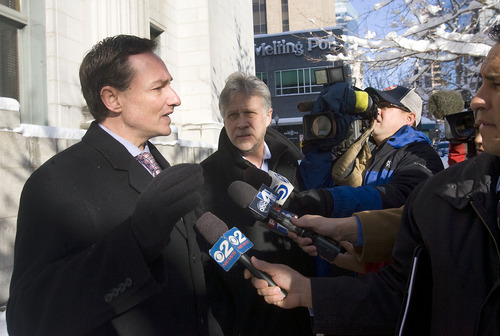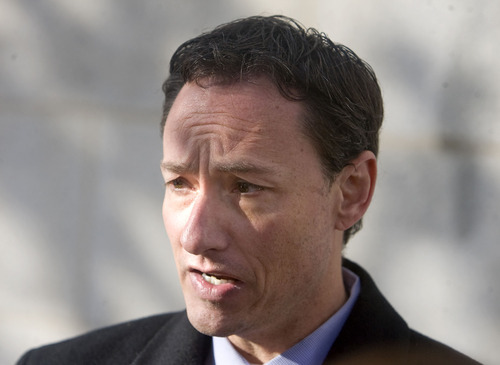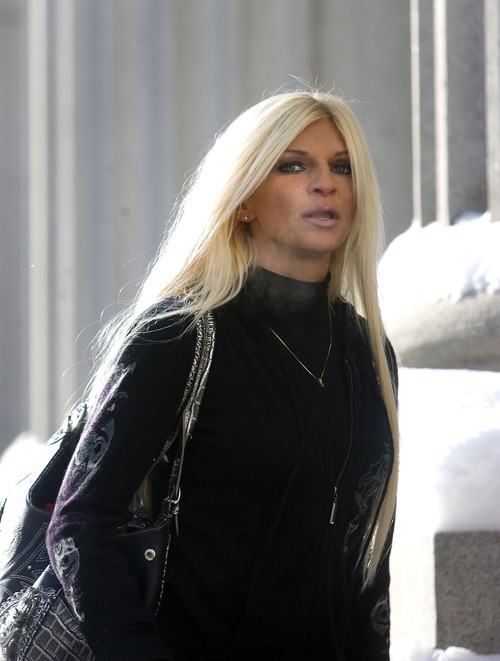This is an archived article that was published on sltrib.com in 2010, and information in the article may be outdated. It is provided only for personal research purposes and may not be reprinted.
For The Tribune's past coverage of the Mitchell trial, including transcripts of testimony from Elizabeth Smart and Wanda Barzee, visit http://www.sltrib.com/topics/mitchell.
The defense attorney who represented Brian David Mitchell after he broke into a church in California said he believed Mitchell to be mentally ill.
Mitchell is on trial in the kidnapping of Elizabeth Smart in 2002. The Salt Lake City trial resumed Monday after a weeklong break. The prosecution has rested its case in chief, and the defense has brought up several witnesses, including Mitchell's parents and siblings as well as his wife, Wanda Barzee.
This week's testimony is expected to focus on issues of mental health.
A tape of Mitchell's hearing in Lakeside, Calif., in February 2003 shows Mitchell saying he had gotten drunk for the first time in 22 years and regretted his actions. He told the judge he was a minister, and that the break-in and subsequent jailing was a turning point in his life.
"This week in jail is like Jonah getting swallowed by the whale. It's turned me around. Nothing like that's going to happen again," Mitchell said.
David Lamb, who was the court-appointed defense attorney, said he allowed Mitchell, who had identified himself as Michael Jensen, to make the Jonah and the whale reference.
"He was being apologetic," Lamb told Mitchell's defense attorney Wendy Lewis.
Lamb said he has worked with mentally ill clients for years and has a brother who has been diagnosed as paranoid. He said he believed Mitchell was mentally ill because of "the disheveled look and religious pronouncements."
Federal prosecutor Felice Viti, though, pointed out the fact that when Lamb was interviewed a year ago for Mitchell's competency hearing, Lamb did not say he thought Mitchell was mentally ill, though no one directly asked him about it.
"I didn't believe my opinion was relevant," Lamb told Viti.
Viti also asked if Mitchell had convinced Lamb of his story about staying with friends in Lakeside and that Mitchell had felt remorseful about his actions. Lamb said he did believe Mitchell's story.
It was far from the first time Mitchell had a run-in with the law.
In 1970, Mitchell appeared in juvenile court for exposing himself to a girl and asking her to touch his genitals.
LeRoy Franke, a new social worker with the 2nd District Juvenile Court at the time, performed an assessment of Mitchell and found "irrational thinking, kind of bizarre behavior that led me to think it was more of a mental health issue than just delinquent behavior."
"Brian stood apart from other delinquent youth in the sense that there were other issues being raised, particularly by his family members," Franke said.
Mitchell was cutting off friendships and withdrawing from his family, spending more and more time alone and studying philosophy, Franke said.
Mitchell adhered to an all-fruit diet and accused his mother of "poisoning the family" if she made meals with meat or vegetables.
He threatened his mother, saying he could "throw you down the stairs and nobody would know I did it," Franke said. Mitchell also threatened his siblings, saying things such as, "I will pluck your eyeballs out."
Mitchell exhibited other elements of what Franke considered "bizarre"thinking, including refusing to ride a bicycle because he "didn't want to get pollution in his lungs."
"He appeared to be bordering on [psychotic behavior]," Franke said, though the social worker said he was unqualified to make such a diagnosis.
Franke had been warned by a family therapist that Mitchell was capable of manipulating even a well-trained social worker. Mitchell became argumentative and refused to be interviewed by Franke during the 1970 investigation.
Franke saw Mitchell and his father, who worked for the Division of Family Services for a time, eating oranges in a cafeteria a few years later. Mitchell appeared to be "doing OK," Franke said. He was friendly and conversant with me. ... I was a little bit relieved that things were going maybe a little better than I thought."
The defense then brought up Don Rosenbaum, an administrator at Utah State Hospital and a licensed clinical social worker.
In 2003, Rosenbaum was the unit administrator in forensic unit, which houses people who have charges pending. As Mitchell got more comfortable, he began interacting with some staff. He and Rosenbaum spoke about The Book of Immanuel David Isaiah.
"He brought out some points of religious doctrine that I questioned him about," Rosenbaum said.
Mitchell talked about revelations and about taking some wives. He also talked about Ezra Taft Benson. When Rosenbaum pointed out some inconsistencies between what Mitchell was saying and his understanding, he became angry and "talked about me being part of the establishment."
"He raised his voice a little bit ... he became visibly angry," he said.
They spoke for about 15 to 20 minutes in the hospital courtyard when, "He yelled very loudly, 'Repent ye. Repent.' It shocked me," Rosenbaum said.
A couple staff members came out and Rosenbaum assured them it was OK.
Then Mitchell "said in a calm voice, 'See, I can get your attention.'"
Gregory Porter was Mitchell's therapist at the Utah State Hospital from 2005 to 2008.
At the Utah State Hospital, officials "were quite skeptical initially that he was mentally ill," Porter said.
Mitchell went through bouts of mutism, which he called "word fasts," Porter said. "He would go without speaking for a period of time in order to humble himself. During those times he would still communicate either through pantomime or writing."
At other times, Mitchell would go on long rants in which "each of the sentences made sense ... [but] the point of the conversation was often lost."
"After a few times it was the same story again and again and again and again. It had a filibuster-type quality. He was not talking with us he was talking at us. He was talking so we could not question."
Mitchell opened up to hospital staff at times.
"He freely told us some things he probably shouldn't have," Porter said. "He told us about the revelation to have enough plural wives. He told us about his decision to take by force a wife. He told us about the break-in to the house and taking Ms. Smart, and going up into the woods and how he — he said humbled her to the depths of the earth — but where he abused her and did terrible things. He told us all that."
In the state hospital, Mitchell spent several hours a day running laps in a small courtyard. He would read and write, but spent very little time studying scripture or writing his own revelations, Porter said.
Mitchell also took to another patient at the hospital. The patient also believed himself a prophet, causing hospital officials some concern, Porter said.
"Having two prophets on the same unit — we thought that might be a combustible situation," Porter said. "But that didn't seem to be the case."
Instead, Mitchell took a "student role" under the patient. Mitchell cut his hair and trimmed his beard to look like the man, Porter said.
The man was into constitutional law and convinced Mitchell that "the court did not have power over him because they used capital letters in spelling his name and capital letters only apply to ships at sea and because Utah is above the high water mark, the court did not have power."
The man also told Mitchell he should no longer wear sweatpants and sweatshirts because of a passage in the Bible warning against "mixed-fiber clothing."
Hospital officials had diagnosed Mitchell as delusional. The interactions with the other patient gave them hope that Mitchell might be "malleable in his delusions" and could be treated with anti-psychotic medications.
Mitchell could be "boisterous and intimidating," "defiant and sort of haughty," narcissistic and manipulative, Porter said. Mitchell would manipulate hospital workers for different foods, new books, even how much dental floss he was allowed.
"[But] Mr. Mitchell was not a master manipulator," Porter said. "I think a lot of people think he is maybe three or four steps ahead. That was not the case. I did not view him as James Bond on the unit. I view him more as Inspector Clouseau."
Porter said Mitchell developed only two relationships in 3½ years in the hospital.
On cross examination, Porter confirmed for prosecutor Alicia Cook that Mitchell told him he was grateful to be at the hospital because he had more privileges there than in jail.
Porter said Mitchell often would refuse to meet with him, and when Mitchell did meet he would dominate the conversation when the topic turned to religion.
Cook also clarified that Porter thought Mitchell's mutism was a form of manipulation.
"There was not a medical reason for the mutism," he said. "It was a choice he was making."
Mitchell also had dietary rules, but would deviate from those.
When confronted, his response was, "I'm a weak man like everyone else."
"You observed that a lot of his behavior was pragmatic?" Cook asked.
"Yes, he was very pragmatic," Porter said.
He also addressed Mitchell's habits in the hospital, which included watching the TV show "Charmed."
"We assumed he would spend hours a day studying, writing and preaching, and that was not the case," Porter said.
When Porter asked Mitchell about his courtroom behavior versus his behavior in the hospital, "He said that by participating in court proceedings, that would grant tacit approval of the justice system."
When Robert Steele requestioned Porter about the purpose of Mitchell's mutism, Porter said Mitchell was hesitant to participate in the legal system and he viewed the staff as part of that system.
"His muteness was a condemnation of us," Porter said.
However, Mitchell didn't always react harshly with people who disagreed with his religious philosophies.
In 1996, Frank DiSalvo noticed two people pulling a handcart in front of his music store in Red Bluff, Calif.
"I walked out and said, 'So what's your story?'" DiSalvo, a guitar teacher and nondenominational Christian minister, recalled from the witness stand Monday.
DiSalvo noticed a small cross on the cart and Mitchell and Barzee said they had traveled from Palo Alto, Calif., and were "just sharing the gospel." Mitchell and Barzee spent a few hours with DiSalvo in the store, talking about the Bible and Christianity.
The couple disagreed with DiSalvo on some doctrinal points, but the discussion was not argumentative. DiSalvo said there were never any "red flags" or signs of mental illness in the month or so Mitchell and Barzee spent camping near Red Bluff.
"Other than the fact that they were hippie type, itinerant ministers pulling a cart ... there was not a whole lot unusual about them," he said. "I've been around hippies before."
Another person overseeing Mitchell at the Utah State Hospital was Paul D. Whitehead, a medical doctor specializing in forensic psychiatry. Whitehead said Mitchell came to his unit with the presumption of mental illness based on a court finding.
"From fairly early on I thought he needed anti-psychotic medications," Whitehead said.
Later, the doctors evaluated evidence looking for signs of mental illness and Mitchell's competency — including one file that had 4,500 pages.
They reviewed video of his court appearance in San Diego, read the book his father wrote and even supervised an hourlong meeting with his father at one point.
"It was an unusual meeting," Whitehead said.
Mitchell asked his father's favorite color, his meaning and purpose in life. Shirl Mitchell was somewhat dismissive.
Shirl Mitchell spent a great deal of time talking about his book. Brian Mitchell asked his father his first memory, and said his own first memory was of eating dog food.
His father told him to "keep up this Immanuel thing, it insulates you from the world," to which the younger Mitchell said he would follow what the Lord said to do.
Whitehead spoke of a family history of mental issues. A grandmother believed her children were kings and queens, another relative was psychiatrically hospitalized for doing baptisms for the dead in her apartment.
At the end of the day, prosecutor Diana Hagen objected to part of the testimony in which Mitchell's competency was discussed.
"We had agreement with defense not to elicit testimony about the competency hearing," she said.
Judge Dale Kimball said that issue would be addressed first thing Tuesday morning.









